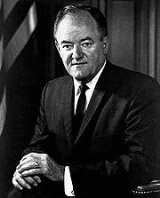
as the 38th Vice President of the United States
. Humphrey twice served as a United States Senator
from Minnesota
, and served as Democratic Majority Whip. He was a founder of the Minnesota Democratic-Farmer-Labor Party
and Americans for Democratic Action
. He also served as Mayor of Minneapolis
, Minnesota from 1945 to 1949.
We can't use a double standard — there’s no room for double standards in American politics — for measuring our own and other people's policies. Our demands for democratic practices in other lands will be no more effective than the guarantee of those practices in our own country.
![]()
To those who say — My friends, to those who say that we are rushing this issue of civil rights, I say to them we are 172 years late. To those who say — To those who say that this civil-rights program is an infringement on states’ rights, I say this: The time has arrived in America for the Democratic party to get out of the shadow of states' rights and to walk forthrightly into the bright sunshine of human rights.
![]()
For all of us here, for the millions who have sent us, for the whole two billion members of the human family, our land is now, more than ever before, the last best hope on earth. And I know that we can, and I know that we shall began [sic] here the fuller and richer realization of that hope — that promise of a land where all men are truly free and equal, and each man uses his freedom and equality wisely well.
![]()

